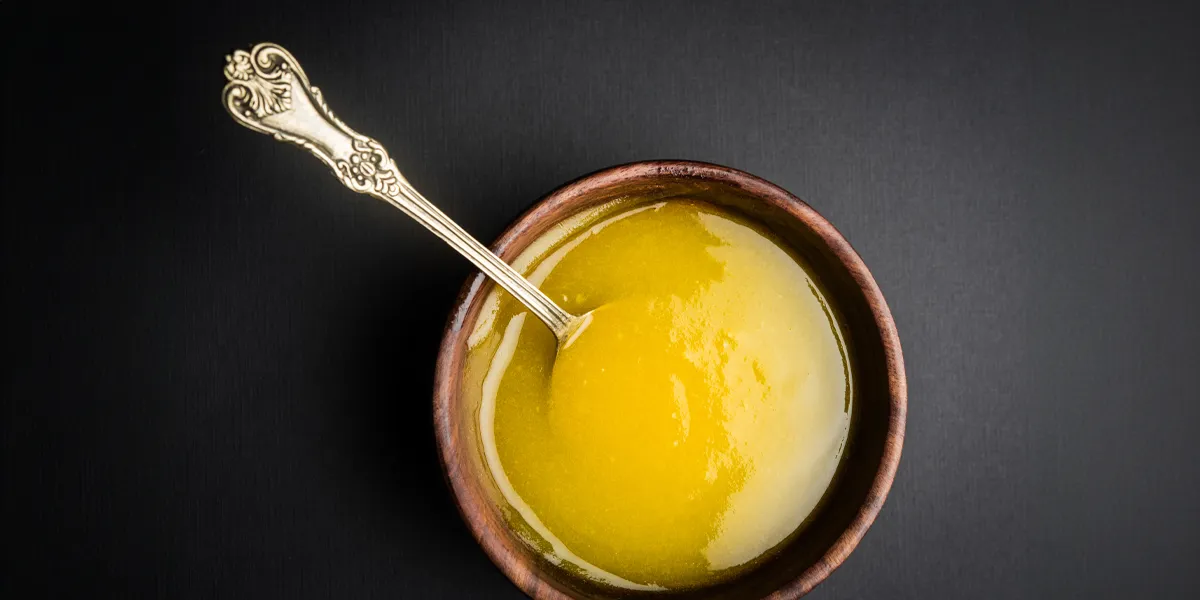Is Ghee Good for Diabetes? Benefits, Risks, Tips and More

According to a study, the average Indian consumes about 4.48 kg of ghee and butter per year, which is around 12.3 grams per person per day as of 2020.
Ghee is a big part of our food and culture, with 30–35% of milk in India turned into ghee. Whether it’s a wedding, birthday, or festival, we all enjoy dishes made with ghee, like ladoo, halwa, chocolate, simple daal chawal, khichdi, or even a plain roti or paratha.
Ghee adds rich flavor and health benefits. But the big question is, “Is ghee good for diabetes?”
What is Ghee?
Ghee, also called clarified butter, is a traditional Indian cooking fat made by heating butter to remove water and milk solids, leaving pure, golden fat. It’s been a part of Indian culture for centuries, used in cooking, religious ceremonies, and even Ayurvedic medicine.
But does ghee have a role in diabetes? Let’s find out, but before that, it’s important to know its nutritional value.
What is the Nutritional Value of Ghee?
| Nutrient | Nutritional Value |
| Energy | 900 kcal |
| Total Fat | 100 gm |
| Vitamin A | 100 mcg |
| Beta Carotene | 600 mcg |
What is the Glycemic Index of Ghee?
Ghee has a glycemic index (GI) of zero, as it contains no carbohydrates. This means it does not raise blood glucose levels, making it a good option for people with diabetes when consumed in moderation.
To know your chances of Diabetes reversal, take the Diabetes Reversal TestDiabetes Reversal
Calculator
Is Ghee Good for Diabetes?
Now, let’s get to the big question: Can ghee help you with diabetes?
1. Portion Control is Key
Ghee is packed with calories, about 45 calories in just one teaspoon. Using ghee in very moderate amounts is an option in our diet.
Too much ghee means too many calories, and that’s not helpful for your diabetes and losing weight.
2. Feeling of Fullness and Flavor
Ghee can make your food tastier, which can help you feel more satisfied. When you enjoy your meals, you’re less likely to snack on unhealthy stuff.
3. Ayurvedic Wisdom
In Ayurveda, ghee is seen as a nourishing and healing food. It’s believed to balance your body and mind, which can be beneficial when you have diabetes.
Are There Any Benefits of Eating Ghee in Diabetes?
1. Healthy Fats
Ghee mostly contains saturated fats, including medium-chain triglycerides (MCTs), which are easier for our bodies to digest than some other fats.
2. Vitamins
Ghee packs fat-soluble vitamins like A (retinol), which are important for our overall health.
3. Lactose-Free
Ghee is often better tolerated by people with lactose intolerance or dairy allergies because the milk solids are removed during the ghee-making process.
Other Health Benefits of Eating Ghee
According to Ayurveda, there are numerous benefits of consuming ghee. Some of them are:
- Improved Digestion: Ghee helps stimulate the secretion of stomach acids, aiding digestion.
- Anti-Inflammatory Properties: Ghee contains butyrate, a fatty acid with anti-inflammatory effects that can improve immunity and gut health.
- Improves Skin Health: The vitamins in ghee contribute to healthy skin and can help improve skin hydration and texture.
Are There Any Risks of Eating Ghee in Diabetes?
1. High in Calories
Ghee is calorie-dense, so consuming it in large amounts can lead to weight gain, negatively impacting diabetes management.
2. High in Saturated Fat
Excessive intake of saturated fats can increase the risk of heart disease, a concern for people with diabetes who are already at higher risk.
What Types of Ghee Are Available, and Which is Better?
1. Cow Ghee
Made from cow’s milk, this type of ghee is considered more beneficial due to its higher nutrient content (such as Vitamin A, Vitamin E, and Vitamin K, along with healthy fats) and is often recommended for daily use.
2. Buffalo Ghee
Made from buffalo milk, it has a higher fat content and is often richer in taste. It’s commonly used in Indian desserts.
Myth Bust: Ghee Marketed as A1 & A2
You may come across ghee marketed as A1 or A2, claiming to be more beneficial. However, A1 and A2 refer to protein types found in milk. Ghee, being pure fat, does not contain protein.
Therefore, the distinction between A1 and A2 ghee is irrelevant.
How to Include Ghee in Your Diet?
1. Cooking Medium
You can replace oil or butter with ghee when cooking. Ghee has a high smoking point, making it ideal for high-heat cooking, like tadka and sabzi, preparing dals, or frying eggs and curries.
2. Spread Over Meals
Enhance the flavor of your meals by spreading a small amount of ghee over hot rotis, rice, or khichdi. This not only adds a rich taste but also helps in better absorption of nutrients without spiking blood sugar levels.
Ghee can be a delightful addition to traditional Indian dishes, making them both tastier and healthier.
3. Snack Time
Mix ghee with roasted makhanas or nuts for a nutritious, diabetes-friendly snack.
Does Ghee Raise Blood Sugar?
Ghee does not raise blood sugar levels because it contains no carbohydrates. However, using ghee wisely is all about balance and moderation.
While ghee can enhance the flavors of your dishes and offer health benefits when consumed in moderation, it’s important not to overindulge.
To add richness, you can add ghee to your cooking preparations, but be mindful of portion sizes. A little ghee goes a long way, so enjoy its delicious, nutty flavor without excess to maintain a healthy and balanced diet.
REVERSED Diabetes in 3 months


5.7%
Happy members
EMI
Guarantee
4.8/5
Diabetes Prime Program
How We At Fitterfly Can Help You?
We all love adding ghee to our traditional meals and enjoy mithais made with ghee. When added or consumed in moderation, ghee does not raise blood sugar levels and can be part of a balanced diet.
At Fitterfly, our nutritional coaches can help you incorporate ghee wisely into your diet, ensuring you enjoy its benefits without compromising your health. They provide personalized advice tailored to your diabetes management goals, helping you maintain a balanced and nutritious diet.
In addition to nutritional support, our success coaches focus on mental wellness, offering strategies to manage stress and stay motivated. Our fitness coaches help you develop and stick to an exercise plan that complements your dietary habits.
Connect with one of our program advisors today at 08068507599 to get started on your journey to better health.
This blog provides general information for educational and informational purposes only and shouldn't be seen as professional advice.
Frequently Asked Questions
How much ghee can a person with diabetes eat per day?
People with diabetes are recommended to consume as little ghee as possible. However, this can vary based on individual dietary needs.
What are the Ghee Recipes for People with Diabetes?
Ghee can be used to make several dishes and snacks that are diabetes-friendly. One such recipe is Ghee and Makhana Snack. Simply heat a teaspoon of ghee in a pan, add one cup of roasted makhanas, and roast until crispy. Enjoy this tasty and healthy snack as part of your balanced diet!
Who should avoid ghee?
Due to its high saturated fat content, ghee should be limited for those with high cholesterol or heart disease risks, and most of the people with diabetes are at risk of heart disease, Hence, they should all avoid it.
What are the bad side effects of ghee?
Too much ghee can lead to weight gain and higher cholesterol, increasing the risk of heart disease. It can also cause digestive issues if consumed in large amounts.
Is oil or ghee better for cooking for diabetes?
Both ghee and oil have benefits and disadvantages. Ghee is good for high-heat cooking and adds flavor, while oils like olive, sarso ka tel, or peanut oil have healthier fats. But whatever you choose for cooking, you should ensure that you use them in moderation and consult a dietitian for personalized advice.




















